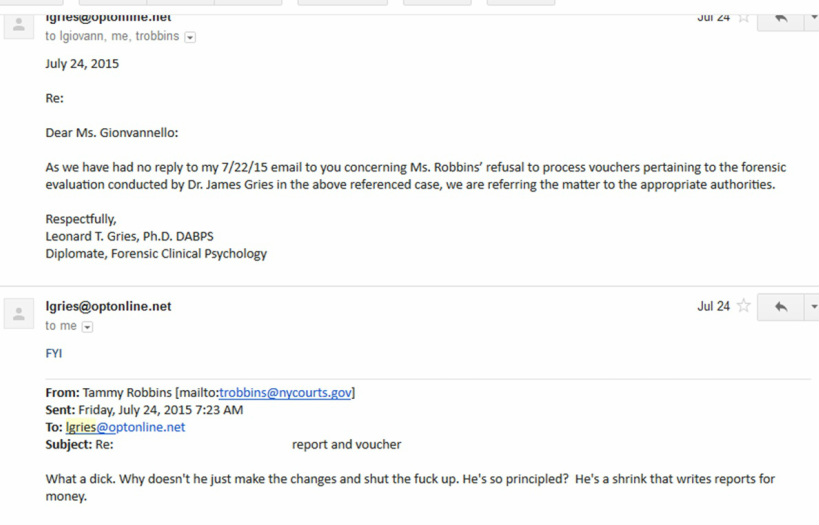Crisis In Family Court:
What Should Be Done When Judges Break The Rules
My recent involvement in a Nassau County Family Court case has exposed me to practices and an underlying culture among some court officials that raise great concern about the extent to which ethical standards are upheld or compromised, i.e. concern about whether the rules for fair play are being followed or broken. In the case in question, there was a concerted effort made by Judge Tammy Robbins, Legal Counsel to the Presiding Judge on the case, Conrad Singer, to edit and suppress portions of the forensic evaluation report that I completed. This constituted what is referred to as ex parte communication, i.e. out of court contact, with me, the evaluator, concerning the content of my report, a practice that is strictly forbidden by ethical guidelines governing the conducting of forensic evaluations. To engage in such ex parte communication is to taint the cloak of impartiality that is so essential to the process. To then attempt to coerce the evaluator to make changes to his report, thereby obfuscating the basis for conclusions reached, is to blatantly subvert the process. In this instance, Judge Robbins ultimately suppressed the entire report, and, acting in behalf of Judge Singer, refused to approve payment for the extensive services rendered. In response to good faith efforts to resolve the matter, Judge Robbins issued the following terse, vulgar e-mail, reiterating her demand that changes to the content of the report be made.
Judge Singer did nothing to remedy the situation. He permitted the forensic evaluation report to be permanently suppressed, thereby depriving the Court of data and information needed to reach objective decisions about a child custody and parenting plan that would optimally meet the needs of the subject child. By doing so outside of court, he circumvented the customary practice of making such decisions about the admissibility of evidence within court proceedings. He thereby broke the rules about the handling of evidence, ignoring information that was collected in order to inform the Court in making determinations about what may be in the best interests of a minor child. He also ignored requests for payment by permitting his Legal Counsel to return unsigned vouchers to me. He thereby broke the rules set forth in his own order of appointment concerning conditions and obligations regarding payment. Only belatedly, under pressure from a state investigation, did he approve partial payment. The investigation, conducted by the office of the Inspector General of the NYS Unified Court System, has been on-going for over a month. It is an internal investigation that is confidential and therefore not open for public scrutiny. The NYS Commission on Judicial Conduct has also been contacted. This Commission is on record for sanctioning Judge Singer for errors he made, including engaging in ex parte communication, approximately six years ago. Finally, a complaint has been filed with the Grievance Committee of the Nassau County Bar Association, pertaining to the unethical actions of Judge Robbins in this matter. Robbins served as County Court Judge in Nassau County from 2005 through 2014, but was voted off the bench in November, 2014. She is currently on the ballot for the November 3, 2015 election, seeking a new 10 year term as County Court Judge. I am seeking a public airing of the facts of this matter, so as to ensure that ethical standards are faithfully observed, particularly by officials of the Court who are charged with intervening in the lives of children and families under duress in a fair and unbiased manner. Investigation is especially necessary because of the failure of the Presiding Judge and his Legal Counsel to acknowledge any mistake or wrongdoing on their part.
It would be most helpful to learn about their motives and reasons for breaking the rules. Were rules broken because allegiance to another entity or other agenda superseded the obligation to adhere to unambiguous ethical standards of conduct? In the present case, we are still awaiting feedback and corrective action to be made by the powers that be who are ultimately responsible for restoring integrity to the Family Court system, when it goes astray. The outcome of investigations will have an impact on all who are involved with or affected by Family Court, including judges, referees, forensic evaluators, lawyers serving as counsel to judges, lawyers for parents, attorneys for the children, the parents of the children and the children themselves, especially the children!
While awaiting responses from investigatory bodies, it may be helpful to begin a dialogue among professionals as well as parents who have their own concerns based upon personal experiences with Family Court. To what degree is greater administrative oversight and monitoring necessary? What training is needed in order to clarify standards and identify the appropriate course of action to take when rules are not being followed? Is there a need for greater transparency concerning any aspects of the child custody/parenting plan litigious process? How can the process be modified to make it less stressful, less adversarial, and more efficient? How can the child’s time in a state of family limbo be minimized?
James R. Gries, Psy.D.
Licensed Clinical Psychologist
Forensic Evaluator
Clinical Director, IEH


 RSS Feed
RSS Feed